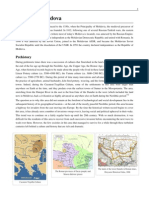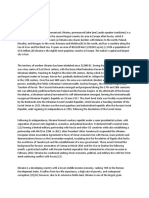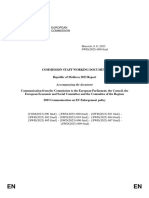0 ratings0% found this document useful (0 votes)
15 viewsMoldova (: Sometimes: Romanian Pronunciation
Moldova (: Sometimes: Romanian Pronunciation
Uploaded by
CristinaMoldova 1
Copyright:
© All Rights Reserved
Available Formats
Download as DOCX, PDF, TXT or read online from Scribd
Moldova (: Sometimes: Romanian Pronunciation
Moldova (: Sometimes: Romanian Pronunciation
Uploaded by
Cristina0 ratings0% found this document useful (0 votes)
15 views1 pageMoldova 1
Original Title
Moldova1
Copyright
© © All Rights Reserved
Available Formats
DOCX, PDF, TXT or read online from Scribd
Share this document
Did you find this document useful?
Is this content inappropriate?
Moldova 1
Copyright:
© All Rights Reserved
Available Formats
Download as DOCX, PDF, TXT or read online from Scribd
Download as docx, pdf, or txt
0 ratings0% found this document useful (0 votes)
15 views1 pageMoldova (: Sometimes: Romanian Pronunciation
Moldova (: Sometimes: Romanian Pronunciation
Uploaded by
CristinaMoldova 1
Copyright:
© All Rights Reserved
Available Formats
Download as DOCX, PDF, TXT or read online from Scribd
Download as docx, pdf, or txt
You are on page 1of 1
Moldova
(/mɒlˈdoʊvə/ ( listen), sometimes UK: /ˈmɒldəvə/; Romanian pronunciation: [molˈdova]),[12][13]
[14]
officially the Republic of Moldova (Romanian: Republica Moldova), is a landlocked country
in Eastern Europe.[15] It is bordered by Romania to the west and Ukraine to the north, east, and
south.[16] The capital city is Chișinău.
Most of Moldovan territory was a part of the Principality of Moldavia from the 14th century until
1812, when it was ceded to the Russian Empire by the Ottoman Empire (to which Moldavia was
a vassal state) and became known as Bessarabia. In 1856, southern Bessarabia was returned to
Moldavia, which three years later united with Wallachia to form Romania, but Russian rule was
restored over the whole of the region in 1878. During the 1917 Russian Revolution, Bessarabia
briefly became an autonomous state within the Russian Republic, known as the Moldavian
Democratic Republic. In February 1918, the Moldavian Democratic Republic declared
independence and then integrated into Romania later that year following a vote of its assembly.
The decision was disputed by Soviet Russia, which in 1924 established, within the Ukrainian
SSR, a Moldavian autonomous republic (MASSR) on partially Moldovan-inhabited territories to
the east of Bessarabia.
In 1940, as a consequence of the Molotov–Ribbentrop Pact, Romania was compelled to cede
Bessarabia and Northern Bukovina to the Soviet Union, leading to the creation of the Moldavian
Soviet Socialist Republic (Moldavian SSR), which included the greater part of Bessarabia and
the westernmost strip of the former MASSR (east of the Dniester River). On 27 August 1991, as
the dissolution of the Soviet Union was underway, the Moldavian SSR declared
independence and took the name Moldova.[17] The constitution of Moldova was adopted in 1994.
The strip of the Moldovan territory on the east bank of the Dniester has been under the de
facto control of the breakaway government of Transnistria since 1990.
Due to a decrease in industrial and agricultural output following the dissolution of the Soviet
Union, the service sector has grown to dominate Moldova's economy and is over 60% of the
nation's GDP. It is the second poorest country in Europe by GDP per capita.[18] Although Moldova
has a relatively high Human Development Index, it is the lowest in the continent, ranking 90th in
the world.
Moldova is a parliamentary republic with a president as head of state and a prime
minister as head of government. It is a member state of the United Nations, the Council of
Europe, the World Trade Organization (WTO), the Organization for Security and Cooperation in
Europe (OSCE), the GUAM Organization for Democracy and Economic Development,
the Commonwealth of Independent States (CIS), and the Organization of the Black Sea
Economic Cooperation (BSEC).
You might also like
- Moldova (Moldova (: SometimesDocument1 pageMoldova (Moldova (: SometimesStelian HudeaNo ratings yet
- MoldaviaDocument1 pageMoldaviaDologan DumitruNo ratings yet
- Moldova (Moldova (: Listen UK Help InfoDocument1 pageMoldova (Moldova (: Listen UK Help InfoghitabatzNo ratings yet
- De Facto: Moldova (Document2 pagesDe Facto: Moldova (Anatol GujaNo ratings yet
- Moldova (Moldova (: UK Help InfoDocument1 pageMoldova (Moldova (: UK Help InfoAnatol MorariNo ratings yet
- FghjklșlkjhgfdsaDocument1 pageFghjklșlkjhgfdsaAnatol MorariNo ratings yet
- Moldova Moldova (: / M Ɔ L D Oʊ V ƏDocument1 pageMoldova Moldova (: / M Ɔ L D Oʊ V ƏNinaAnghelNo ratings yet
- Moldova 2Document1 pageMoldova 2MarkB15No ratings yet
- Russian Frontiers and Moldavia - Report For SEEMO-libreDocument6 pagesRussian Frontiers and Moldavia - Report For SEEMO-libreGeorge RonceaNo ratings yet
- About Republic of MoldovaDocument35 pagesAbout Republic of MoldovaGost hunterNo ratings yet
- Moldova Officially The Republic of Moldova Is ADocument1 pageMoldova Officially The Republic of Moldova Is ARadu GherbNo ratings yet
- Mold OvaDocument1 pageMold Ovalory0893No ratings yet
- MaldovaDocument48 pagesMaldovayadrahNo ratings yet
- Mold OvaDocument6 pagesMold OvaOlea ZubcovaNo ratings yet
- Moldova HistoryDocument2 pagesMoldova HistoryAlina VladNo ratings yet
- Independent Republic of Moldova 1991: Gaining IndependenceDocument9 pagesIndependent Republic of Moldova 1991: Gaining IndependenceKristina GheorghiuNo ratings yet
- Moldova CONNECT Country ProfileDocument12 pagesMoldova CONNECT Country ProfileIon MelnicNo ratings yet
- UnifocationDocument3 pagesUnifocationjameswuNo ratings yet
- MoldovaDocument27 pagesMoldovafanea_viorelNo ratings yet
- RomaniaDocument1 pageRomaniaAdrianaNo ratings yet
- RomaniaDocument1 pageRomaniaZhandy ZanduetaNo ratings yet
- Moldova (MD)Document29 pagesMoldova (MD)AliancerypoNo ratings yet
- LUKK Chisinau XP MANUALDocument4 pagesLUKK Chisinau XP MANUALgeilenberghanneloreNo ratings yet
- Romania (: Ro - Nee-ƏDocument1 pageRomania (: Ro - Nee-ƏAnonymous 2ArX2QDhNo ratings yet
- Unification of MoldaviaDocument19 pagesUnification of MoldaviaPetcuci DayanaNo ratings yet
- Romania (: Ro - Nee-ƏDocument1 pageRomania (: Ro - Nee-Əmelek_cadirNo ratings yet
- Romania (: ro-MAY-nee-əDocument2 pagesRomania (: ro-MAY-nee-əСтепанNo ratings yet
- Etymology: Moldova Moldova (Document10 pagesEtymology: Moldova Moldova (Mihaela TurcanNo ratings yet
- RomaniaDocument1 pageRomaniaabalcNo ratings yet
- Ukraine (A) Is A Country in EasternDocument1 pageUkraine (A) Is A Country in Easternplayingpiano2100No ratings yet
- North Macedonia (Macedonian: of North Macedonia (MacedonianDocument1 pageNorth Macedonia (Macedonian: of North Macedonia (MacedonianJorge ContrerasNo ratings yet
- MACEDONADocument1 pageMACEDONAАнастасијаСтаменковскаNo ratings yet
- RomaniaDocument1 pageRomaniaMihai JuncuNo ratings yet
- RomaniaDocument1 pageRomaniaAndreeaGaburNo ratings yet
- RomaniaDocument1 pageRomaniahannaslominska.2008No ratings yet
- Molo DvaDocument25 pagesMolo DvaRoma GutanNo ratings yet
- History of MoldovaDocument18 pagesHistory of MoldovamoufkirNo ratings yet
- Wewe 324#Document1 pageWewe 324#Scott MarshallNo ratings yet
- Rep MoldovaDocument1 pageRep MoldovaDodon AdrianNo ratings yet
- RomaniaDocument1 pageRomaniadorucipi6856No ratings yet
- Moldova 6Document1 pageMoldova 6MarkB15No ratings yet
- Član 8Document1 pageČlan 8veronika.puljic19No ratings yet
- UKRAINEDocument2 pagesUKRAINEHiroNo ratings yet
- RomaniaDocument1 pageRomaniaAndreea SabăuNo ratings yet
- Moldova's Relations With European Union: The Wind of Change?Document15 pagesMoldova's Relations With European Union: The Wind of Change?Ana Gutu100% (1)
- Romania CountryDocument1 pageRomania CountryAndrei GheltuNo ratings yet
- RomaniaDocument1 pageRomaniaAurel StoianNo ratings yet
- Moldova and The Transnistrian Conflict: Marius Vahl and Michael EmersonDocument29 pagesMoldova and The Transnistrian Conflict: Marius Vahl and Michael EmersondinpucioasaNo ratings yet
- RominiaDocument1 pageRominiaIoana MariaNo ratings yet
- North Macedonia: Macedonia and FYROM) - in June 2018, Macedonia and Greece Resolved The Dispute WithDocument1 pageNorth Macedonia: Macedonia and FYROM) - in June 2018, Macedonia and Greece Resolved The Dispute WithOrgito LekaNo ratings yet
- RussiaDocument1 pageRussiaAzreen Anis azmiNo ratings yet
- North Macedonia: Macedonia and FYROM) - in June 2018, Macedonia and Greece Resolved The Dispute WithDocument1 pageNorth Macedonia: Macedonia and FYROM) - in June 2018, Macedonia and Greece Resolved The Dispute WithOrgito LekaNo ratings yet
- RomaniaDocument1 pageRomaniaMau MariusNo ratings yet
- History of AzerbaijanDocument1 pageHistory of AzerbaijanmuqarrabhassnainNo ratings yet
- RomaniaDocument1 pageRomaniaAnonimFfrruummooaassaaAnaNo ratings yet
- Romania MeaDocument1 pageRomania MeaMariaStoicutaNo ratings yet
- Serbia Republic of Serbia: Република Србија Republika SrbijaDocument1 pageSerbia Republic of Serbia: Република Србија Republika SrbijaVojdan StefkovskiNo ratings yet
- RomaniaDocument1 pageRomaniaCarmen IrimiaNo ratings yet
- Republic of MoldovaDocument11 pagesRepublic of MoldovaThomasNo ratings yet
- Aps 2024 001Document13 pagesAps 2024 001Lilia_gheorghitaNo ratings yet
- The Honouring of Obligations and Commitments by The Republic of MoldovaDocument34 pagesThe Honouring of Obligations and Commitments by The Republic of MoldovaJurnalNo ratings yet
- Annex H Guidelines For Filling in The Application Form RegularDocument34 pagesAnnex H Guidelines For Filling in The Application Form RegularoanaNo ratings yet
- Investment - Project - Miepo 02 11 12 FinalDocument24 pagesInvestment - Project - Miepo 02 11 12 FinalOrganizația de Atragere a Investițiilor și Promovarea Exportului din MoldovaNo ratings yet
- Welcome To Moldova: MetomDocument57 pagesWelcome To Moldova: MetomAnpasc AnpascalNo ratings yet
- Miller - Moldova Under PlahotniucDocument208 pagesMiller - Moldova Under PlahotniucJurnal TV100% (3)
- Миграция и межкулльтурный диалогDocument5 pagesМиграция и межкулльтурный диалогTimur LukinNo ratings yet
- IRENA RRA Moldova 2019 ENDocument64 pagesIRENA RRA Moldova 2019 ENnadeaNo ratings yet
- Curriculum VitaeDocument2 pagesCurriculum VitaeAnonymous 3m1o7KnDNo ratings yet
- Bpo 2021Document28 pagesBpo 2021Vlad BuracNo ratings yet
- Brexit, President Trump, and The Changing Geopolitics of Eastern EuropeDocument290 pagesBrexit, President Trump, and The Changing Geopolitics of Eastern EuropeDiego DebortoliNo ratings yet
- The Impact of Parental Deprivation On The Development of Children PDFDocument112 pagesThe Impact of Parental Deprivation On The Development of Children PDFIrina MorosanNo ratings yet
- Public Opinion Survey Residents of Moldova: September 29 - October 21, 2015Document54 pagesPublic Opinion Survey Residents of Moldova: September 29 - October 21, 2015Elena PutregaiNo ratings yet
- Democracy in Divided Societies: Horowitz, Donald LDocument22 pagesDemocracy in Divided Societies: Horowitz, Donald LAlex FreedNo ratings yet
- FOREN ProgramDocument44 pagesFOREN ProgramSimona NeaguNo ratings yet
- Atti Della Società Per La Preistoria e Protostoria Della Regione Friuli-Venezia Giulia. Volume XVI, 2006-2007. TriesteDocument139 pagesAtti Della Società Per La Preistoria e Protostoria Della Regione Friuli-Venezia Giulia. Volume XVI, 2006-2007. TriestePaolo Biagi100% (1)
- TRANSNISTRIAN PROBLEM A View From Ukrain PDFDocument190 pagesTRANSNISTRIAN PROBLEM A View From Ukrain PDFAngela Goma TrubceacNo ratings yet
- Marina Supac MA ThesisDocument20 pagesMarina Supac MA Thesisec_eiucNo ratings yet
- Traditions in MoldovaDocument2 pagesTraditions in MoldovaGabriel ButnaruNo ratings yet
- Info General of Moldova CorectDocument9 pagesInfo General of Moldova CorectJeka MkNo ratings yet
- The Book of FamineDocument4 pagesThe Book of FaminecartoonkidNo ratings yet
- Mediafactbook: ROMANIA 2019Document51 pagesMediafactbook: ROMANIA 2019Phistach PNo ratings yet
- RomaniaDocument94 pagesRomaniaLazr MariusNo ratings yet
- SWD 2023 698 Moldova ReportDocument127 pagesSWD 2023 698 Moldova ReportZiarul de GardăNo ratings yet
- Museum Entrance: MuseumsDocument14 pagesMuseum Entrance: MuseumsVasix ZoltanNo ratings yet
- Valentin BencheciDocument4 pagesValentin BencheciValentin BencheciNo ratings yet
- Moldova HistoryDocument2 pagesMoldova HistoryAlina VladNo ratings yet
- Moldova Soya Sector Study Final Draft Feb 2016Document81 pagesMoldova Soya Sector Study Final Draft Feb 2016cipliliNo ratings yet
- ASG Report D. Munca-AftenevDocument12 pagesASG Report D. Munca-AftenevDaniela Munca-AftenevNo ratings yet























































































